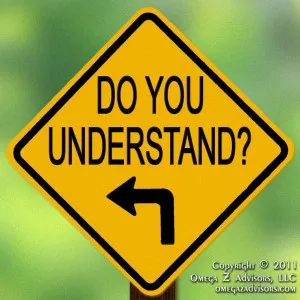Education Bias (Pt 5): Understanding vs. Appreciation
- Problems With Asking “Do You Understand?”
- Why More Information And Education Don’t Solve Problems
- Education Bias (Pt 3): Leadership Over Knowledge
- Education Bias (Pt 5): Understanding vs. Appreciation
 Someone once asked, “Mike, do you think people understand you?”
Someone once asked, “Mike, do you think people understand you?”
“No,” I answered.
“Does that bother you?”
“No.”
“Why not?”
“Well, it’s very difficult, if not impossible, to understand yourself let alone someone else. Heck, even science doesn’t understand completely how we work. So, to expect someone to understand you not only seems unrealistic but unfair. Besides, appreciating other people is more important.”
“Is there really a difference?”
“Oh yes, a very big difference, it’s the whole watch analogy: understanding how a watch works is quite different from appreciating what it does for you. The same is true with people. I might not understand someone or how he does something, but I can certainly appreciate what we does. I can appreciate the value of him and his work.”
“But don’t you gain appreciation through understanding?”
“Yes, but it’s not necessary. This happens all the time with new technology. How much of that do we understand? Yet we have a great appreciation for what it does for us. In fact, there are cases where our appreciation increases when we don’t understand, as with magicians. The fact I can’t figure out how he did the trick often increases my appreciation. How often do we say to people when they do something amazing, ‘I don’t understand how you can do that!’?
“Also, just because we understand, doesn’t mean we appreciate. An inventor might understand the technology, but that doesn’t mean he appreciates what it can do for others. I might understand how an artist paints or a musician plays, but that doesn’t mean I appreciate their work.
“Our emphasis on ‘understanding someone,’ shows our bias towards education as an all-purpose solution for whatever ails our appreciation of life and people. In reality, it takes much more than education to gain such appreciation.”

